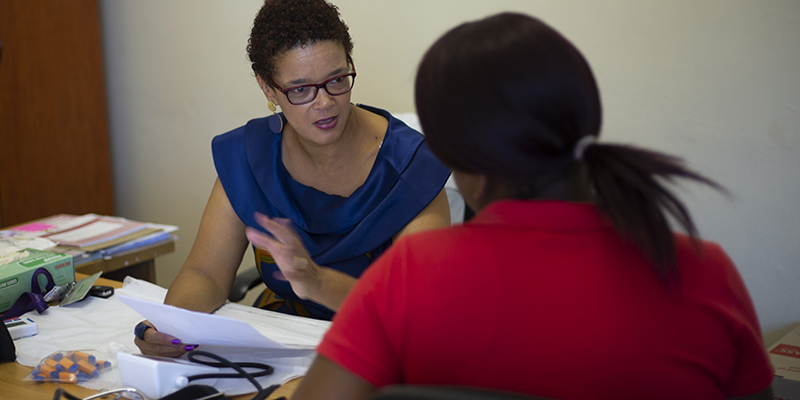Breaking The Cycle of HIV For my Daughter’s Sake

It’s people like Felicity Basson, HST’s Adolescent and Youth Friendly Services and DREAMS Coordinator, who make it easy for Pearl Ngcobo and her peers to access health services
“My mother died of AIDS, and recently, at the age of 22, I was also infected. But I am going to make sure that I break this cycle for my daughter,” says Pearl Ngcobo.
At first glance, Pearl looks like any other young student at the UNISA campus in Pietermaritzburg, South Africa, but it quickly becomes apparent that she has not had an easy life.
“I started attending the clinic because my friend told me that you can get a Pap smear here. Our Student Representative Council (SRC ) also told us that the clinic is for students so that they can test for HIV, TB and STIs.”
Pearl says that the campus clinic is ideal, considering she was unable to use the health facility in her home community due to ill-treatment and lack of confidentiality by clinic staff.
“At the clinic [in my hometown], they keep the consulting room door open and everyone in the queue can hear your business. Also, the nurses will tell your parents if you come to the clinic. I know this because our neighbor works at the clinic and gossips about everyone and their medical issues.”
Pearl says that the on-campus clinic, which uses a youth-friendly approach, has made her much more comfortable about seeking health care. “When I come here I feel much better and more grounded. It’s because we have this clinic and these nurses are different that made me ready to test for HIV,” she explains.
“When I first started feeling sick, I was quite traumatized and couldn’t think straight. The nurse here was very calm and reassured me that even if I were HIV-positive, it’s not the end of the world. She told me that HIV is a chronic condition like any other and can be managed with medicine. Nowadays it is only one tablet a day.”
Pearl’s fiancé is also HIV-positive and he accuses her of infecting him, creating turbulence in their relationship. She brought him to the clinic when he also started showing signs of illness.
“He has changed his ways since we came here and got counselling and medical help. Our CD4 counts were very low, so we had to learn to eat healthily. The clinic also gives us Bactrim for opportunistic infections.”
For Pearl, this is history repeating itself.
“My mother died of AIDS when I was seven and I was raised by my grandparents. They never actually disclosed to me that she had AIDS, but they would throw it in my face during arguments. They also have a lot of anger towards my father and say that he is useless.”
Pearl says that this information made her feel worthless. She started drinking heavily and taking umgwinyo (Ecstasy). “It really helped me to forget a lot of painful things.”
Pearl says that since attending the on-campus clinic, she has met people who are supportive and make her feel hopeful about her future and the future of her four-year-old daughter. Her child was one of the major reasons she wanted to test for HIV and get started on treatment.
“My daughter is HIV-negative and it is going to stay that way. She will not grow up without me. I am going to stay alive so that we don’t repeat the same pattern. It ends with me.”
Nkule Majola, an Health Systems Trust (HST ) Nurse Clinician, says that the on-campus clinic focuses on offering comprehensive services in a private, welcoming, non-judgemental and friendly atmosphere.
“When liaising with university management, we learned that they have an enrollment of about 12,000 students and daily student walk-ins of about 800 who come to campus to access the library and study groups. With such a high number of students, setting up this clinic was an absolute must! My approach to the students is not just to offer clinical assistance but also psychosocial care. In providing health care, we aim for a holistic approach dealing with the whole person,” she explains.